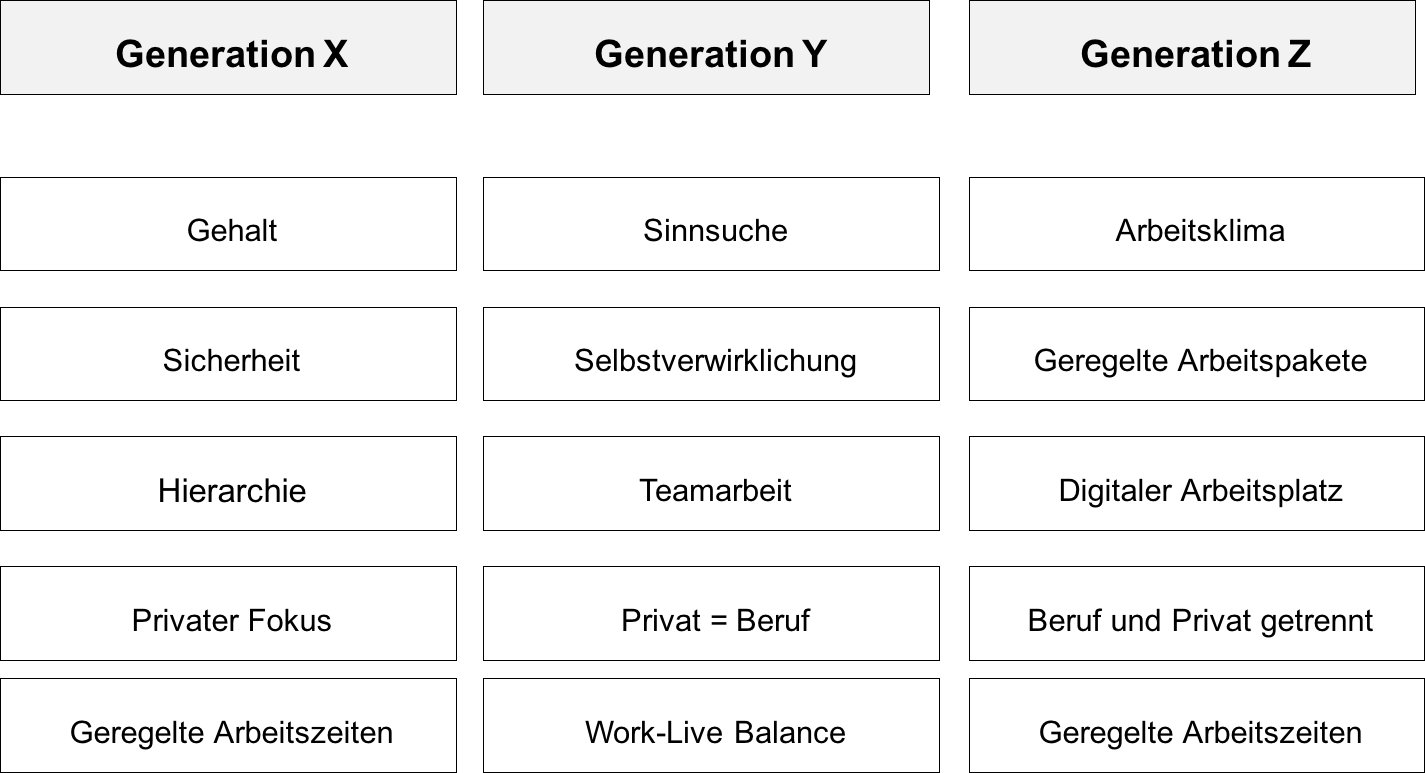tolia[fotolia]For many years everything was very clear with regard to generation management: We have a Generation X who works diligently and loyally for us and a Generation Y who is looking for meaning and self-fulfillment. The consequences can now be clearly seen: companies are increasingly turning into luxury hotels with relaxation rooms, open spaces and, in some cases, fully equipped fitness studios. But now there is another generation that is pushing its way into the labor market: Generation Z. The result is hybrid teams from three generations that present managers with tough challenges. After a short introduction, I would like to give differentiated recommendations for the management of the three generations.
Generation X
If you look at that Portal Absolventa, one finds the following definition: For the so-called Generation X this is professional advancement the most important goal when looking for a job. At least that is what the study results of the personnel consultancy Robert Half read. According to the survey, this generation of 30 to 50-year-olds is also characterized as ambitious, individualistic and ambitious. The members of Generation X are well educated and work in order to be able to afford a materially secure life. In contrast to its predecessor generation, Generation X does not place work before other needs, but rather sees them as a means to an end.
Generation Y
To this she says Website Gründerküche : The representatives of Generation Y are considered to be comparatively well educated, often with a technical college or university degree. You grew up with the Internet and mobile communication, and you lead a technology-savvy life. Generation Y also differs from previous generations in terms of their attitude towards work:
- Generation Y particularly likes to work in virtual teams.
- She is suspicious of deep hierarchies, hierarchies by title anyway.
- Millennials are optimistic, confident and have little faith in the government.
- Fun and, above all, a deeper sense of purpose at work are particularly important to millennials.
- They also want to work independently on projects and realize themselves.
- The term work-life balance was almost invented for Generation Y: Hardly a generation attaches more importance to this eternal balancing act. But it’s less about free time and more about self-determination: the Gen Y representative wants to define himself when he works where.
Generation Z
Generation Z is currently only entering the labor market, so few well-founded facts are known about them so far. That’s why I’m going back to the definition in Portal Absolventa use: Today’s young people who will enter the labor market in the next few years belong to the so-called Generation Z. They are the generation that completely includes digital technologies grew up: Internet and smartphones are a natural part of her life – both at work and in private life. Unlike Generation Y, Generation Z differentiates more again between work and personal life. Fixed boundaries and clear structures are clearly wanted again. Taking the business laptop home with you after work is not an option. Self-realization is no longer only sought in work, but above all in work leisure and in social contacts.
Generation management in hybrid teams
If you look into that Book by Klaffke, you read: “Happy cows give more milk.” This supposed and much-quoted farmer’s wisdom is gaining more and more supporters in business life in the figurative sense. From a common sense perspective, there is a lot to suggest that people who feel comfortable at work actually do better and walk the famous “extra mile” more often. Ultimately, this should have a positive effect on the success of a company – also in a monetary sense.
The point is to lead each of the three generations properly and to optimally align the company with them. But how does this work and with which instruments can this be done? Not all of the three generations like working in the home office and agility cannot solve all problems as an egg-laying pig. And now there are hardly any teams that consist exclusively of one generation. Generation management is therefore increasingly becoming an important management tool.
Generation management X
On the Generation Z website you can find the following tips: Generation X workers rate work as a central part of life, but show a particular interest in a balanced relationship between professional and private life, whereby they always act for their own benefit. In private, Generation X tends to strive for an individual orientation and alternative lifestyles.
Clearly regulated working hours, a good salary and career as well as long-term security are important here. These generations are also said to have a high respect for hierarchy. So it is about that work as a necessity for the private Realization is seen.
Generation management Y
Here shows that Magazine heap some exciting points on: The young generation wants to be taken seriously, right from the start. She wants attention, recognition and challenging tasks that are fun and at the same time make sense (depending on the individual attitude, there are differences in weighting). Getting all information is important, as is having freedom of choice. Modern work equipment is a matter of course for Generation Y and supports working in teams and networks. Appropriate remuneration and individual development opportunities are of central importance.
Ergo, a lot here points to home office, flexible working hours, team events, agile teams with many role and project changes. Agile leadership is certainly recommended here. Above all, it is important to find an individual solution for each employee. So deadlocked processes and assembly line annual meetings are not effective here Method.
Generation management Z
As mentioned earlier, not much in-depth data is known about this generation. However, it is currently evident that a different approach is primarily necessary. So puts the Young heart agency clearly : More and more HR employees and recruiters are looking at ways to address Gen Z. Clever HR colleagues try out many exciting ways. Be it the application via WhatsApp, influencer marketing, the selection of a suitable manager via time-delayed video interviews, digital events at high school or personnel campaigns via Snapchat.
There are numerous studies that show that the requirements for Gen Z are largely the same as those for Generation Y. Personally, however, I cannot really believe this – some of the existing studies also indicate significant differences.
So can be found in the magazine the world : Keywords in job vacancies such as work-life blending, i.e. the mixing of work and leisure, have a negative effect on young people. “Clear after-work hours” is now again an effective lure. Further calls the world as green: That has nothing to do with laziness, but with the fact that work is possible anywhere and anytime in the digital age. ”If you are not careful, life will only consist of work.
After a little googling, I have an exciting one Study from Bremen found. I have noted the results briefly and concisely in bullet points below:
- Overall, the working atmosphere is the most important criterion.
- Clear tasks, clear boundaries and a strict separation of professional and private life are important.
- A well-equipped workplace is desirable – no desk sharing and no open spaces.
- A clear structure and regulated work packages are important.
- By the way, older generations have to get used to the fact that their statements from Gen Z are immediately checked for correctness via smartphone.
- Hierarchical authority matters little to Gen Z. However, she is willing to show respect for experiences, arguments, and authentic behavior.
Conclusion: every generation is different

X, Y, Z – 3 generations have recently entered our job market at the same time. Each of the generations demands individual values and working environments. While Generation X comes with regular working hours and a focus on private life, Generation Y focuses on the search for meaning and self-realization. The result are new working models and agile methods that are conquering German offices. But now Generation Z comes and wants to turn it all around again? Time will tell! It remains exciting to see how Generation Z will be integrated into the existing models and how this generation will shape the world of work. But now I’m also interested in who my readership is: Which generation do you belong to?
[yop_poll id=”28″]
[werbung]
[fotolia]



